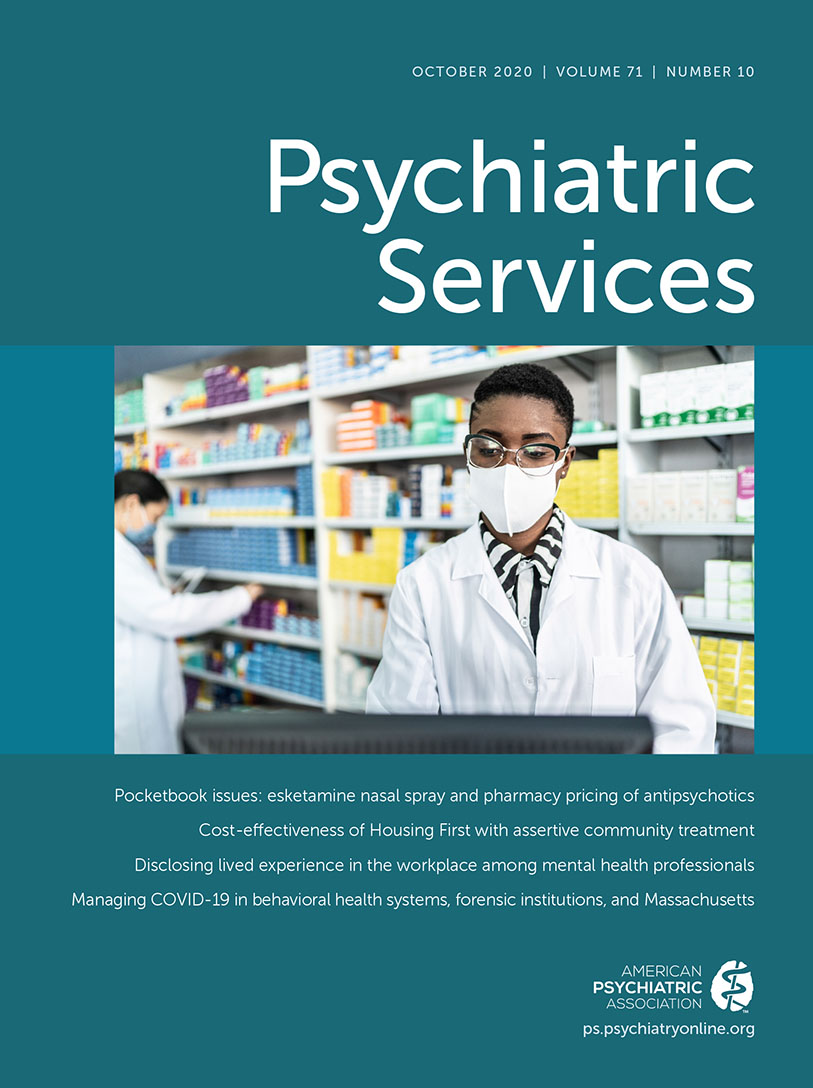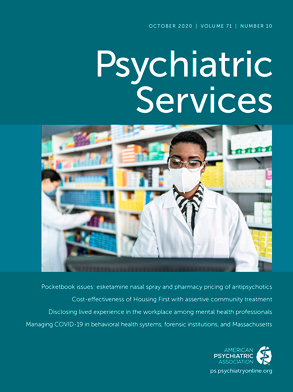In 2019, as a fourth-year psychiatry and preventive medicine resident, I became president of the New Hampshire Psychiatric Society (NHPS), my state’s branch of the American Psychiatric Association (APA). My tenure as president has taught me valuable lessons about myself and leadership, and it has helped me realize the important role that all psychiatrists can—and should—play in state-level legislative advocacy. The APA has published a resource document (
1) for advocacy training of psychiatry residents, but such training is inconsistently implemented across residency programs. As psychiatrists, we are often our patients’ first allies, and it is ethically imperative that we strive to be their most effective advocates. In this personal account of my experiences, I will discuss the challenges faced and the rewards gained by psychiatrists who seek leadership and advocacy experiences during residency.
I was drawn to psychiatry as a medical student, compelled by the immense resilience psychiatric patients demonstrated in the face of extreme adversity. I found my passion in serving those who actively manage mental illness with often inadequate support systems. Idealistically, I believed that a psychiatrist’s role is that of an astute clinician—serving patients through medical knowledge. I entered the profession impassioned with a goal of diligently serving our remarkable patients. During my residency, I realized that the adversity affecting our patients was driven not only by mental illness, but also by social and policy-related factors, which can synergize to exacerbate, or even be root causes of, symptomatology. To fulfill my professional goal, I realized that I must address all these factors concurrently and that clinical acumen alone would not be sufficient—leadership and advocacy would also be essential.
My position as NHPS president is unusual. There are no other reported instances of residents leading a state APA branch as president, and APA leadership opportunities for residents are limited. That I, as a resident, became president of NHPS highlights scarcity not only of psychiatrists in general, but also of those willing to hold leadership positions in New Hampshire. My NHPS journey involved much serendipity, from serving as resident representative on 1NHPS’s executive board, to acting as vice-president when a mentor retired months into his tenure, to becoming president in a state with a tremendous need for leaders in psychiatry.
In so unfamiliar a position, I felt unprepared and was acutely aware of my vulnerability. I had experienced “impostor syndrome” throughout every stage of my education, feeling as if I did not belong or that my colleagues were more deserving. However, the magnitude of self-doubt in my new role was not one that I had experienced previously. I, like my colleagues, completed a rigorous course of study in medical school. Furthermore, I had served the NHPS for nearly 4 years. Regardless, I could not help but feel undeserving of my station. Although I belong to a racial minority group that is well-represented within medicine, a dearth of racial diversity in New Hampshire made it harder for me to dismiss feelings of being out of place. This contributed to my perception that my position was the result of external serendipity rather than of intrinsic merit. Impostor syndrome is common among medical trainees (
2,
3), especially among those belonging to marginalized communities (
4). Psychiatry, as a field with great diversity among patients and practitioners, should be proactive in mitigating impostor syndrome, particularly among people from marginalized communities. Lack of leadership training and opportunities can contribute to impostor syndrome, and providing training and opportunities for psychiatry residents can be vital for producing confident leaders and advocates. In the first lesson of my presidency, I learned that impostor syndrome is a natural feeling that arises when one is thrust into an unfamiliar role. However, acknowledging my capabilities and limitations (and realizing that NHPS members do not expect perfection) helped diminish this feeling.
Soon after my tenure as NHPS president began, the importance of patient advocacy became immediately clear. I recalled the frustration of altering treatment plans when an insurer declined to cover an inpatient stay. I remembered the frustrations of my patients who had to choose which prescriptions to fill because they could not afford all of them. Advocacy offered a way to channel my passion to make a difference for these patients. I could easily appreciate that advocacy work would be the cornerstone of my role as NHPS president. Psychiatrists typically care for patients on a one-on-one basis, and this can feel Sisyphean because at times nonclinical factors can seem to negate clinical care. This feeling is especially pronounced when system inadequacies and governmental policies do not support—or even actively oppose—the care of patients with mental illness. These factors can conspire to impart an additive sense of helplessness and lack of autonomy for psychiatrists, let alone for our patients. These circumstances motivated me and illustrate the crucial role of advocacy in empowering both patients and psychiatrists—and why we must provide formal advocacy training for residents.
Without this formal training, advocacy work seemed daunting. I was unsure how to approach state legislators, let alone propose legislation. As psychiatrists, though, we have a unique perspective and can synthesize the lived experiences and struggles of our patients with our medical knowledge to help shape policy that is more supportive of mental health care. Understanding my role as being a liaison among my patients, colleagues, and the legislature, I realized that policy development would be perhaps the most crucial aspect of this role. Despite my initial trepidation, I found that legislators appreciate feedback on bills that affect care for patients seeking mental health services in our state.
A final key part of advocacy in which I have been involved is proposing legislation. Besides being a means for addressing care gaps, proposing legislation is excellent practice for solving complex problems in an interdisciplinary fashion. As NHPS president, I collaborated with the APA’s legislative development team and several legislators to propose two bills: one to enforce mental health parity and another to support the collaborative care model. These bills will move through the state’s legislature during the current legislative session and hopefully pass to remove barriers to the practice of psychiatry in New Hampshire.
This valuable work must also be sustainable. My presidency teaches me that galvanizing residents with a vision of affecting the levers of policy to improve the delivery of mental health care can help sustain high-quality care. To that end, the NHPS and APA developed an Advocacy Training Day, allowing residents to meet with legislators and the APA’s legislative development team. It represented an important step toward sustainability, as residents received didactic education and practical demonstrations of how accessible our state’s legislators and the APA’s resources are. The event was successful and will be even more so if more residents are encouraged and emboldened to pursue leadership and advocacy.
The experience of organizational leadership and advocacy during residency is one that I enjoy and one that I encourage other psychiatry residents to pursue. Although the roles of resident and leader may seem disparate, reconciling them represents an important challenge, given that psychiatrists often wear multiple hats. Reconciling my dual role became easier after I identified ways in which the two roles inform one another. My leadership role expanded my capability to collaboratively solve clinical problems, and my role as resident enabled me to identify system inefficiencies and care gaps that should be addressed through policy. Furthermore, being a resident lends unique perspectives to my leadership and advocacy work (because residents rotate through many areas of psychiatry and thus work within several practice settings), but also brings unique challenges. For example, most NHPS members have been practicing for longer than I have been a resident. Given wide gaps in age, experience, or both between me and other members, I may be regarded merely as a trainee or mentee rather than a colleague or leader. Another challenge specific to advocacy work is that legislators and other advocates may not understand what a resident physician is. In both cases, overcoming these challenges and gaining the trust of important stakeholders requires patience, consistency, and excellent communication skills. Both leadership and advocacy require these skills, which are also vital to clinical practice; thus, residents who choose to embrace these challenges are likely to gain these skills earlier than those who do not.
Reflecting on my unique experience as both resident and NHPS president, I feel that the challenges of this position have yielded several rewards and valuable lessons. I have learned that the practice of psychiatry must include more than just clinical care, and that leadership training should be integrated into our formal education. To be effective psychiatrists, we must be not only clinicians, but also leaders and advocates. By emphasizing only clinical skills early in training, we do a disservice to both our patients and our profession. Psychiatrists should enter the workforce prepared and excited to enact change in their patients’ lives and communities, and advocacy skills are integral to this task. Leaving learning of these skills to later career stages unnecessarily thwarts our progression as professionals, impedes our field, and has a negative impact on our patients’ well-being. Encouraging leadership throughout training allows for more professional growth with fewer lost opportunities, both individually and at the system level.
We have a unique opportunity to cultivate interest in leadership and advocacy among other members of our profession. Resident and attending psychiatrists alike should not hesitate to step into roles that will allow for full immersion in leadership and advocacy. Early involvement and empowerment are imperative for producing leaders capable of identifying and responding to areas of need—both clinically and politically—for the duration of a young psychiatrist’s career.

